后跟动名词的动词
动词后接动词不定式/动名词作宾语用法小结
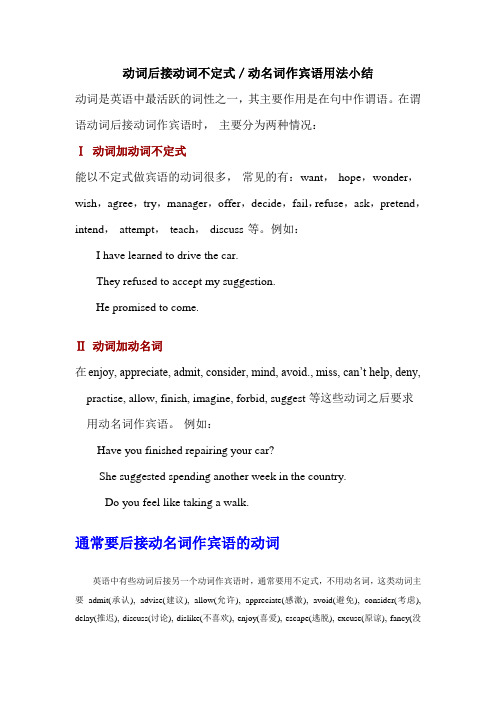
动词后接动词不定式/动名词作宾语用法小结动词是英语中最活跃的词性之一,其主要作用是在句中作谓语。
在谓语动词后接动词作宾语时,主要分为两种情况:Ⅰ动词加动词不定式能以不定式做宾语的动词很多,常见的有:want,hope,wonder,wish,agree,try,manager,offer,decide,fail,refuse,ask,pretend,intend,attempt,teach,discuss等。
例如:I have learned to drive the car.They refused to accept my suggestion.He promised to come.Ⅱ动词加动名词在enjoy, appreciate, admit, consider, mind, avoid., miss, can’t help, deny, practise, allow, finish, imagine, forbid, suggest等这些动词之后要求用动名词作宾语。
例如:Have you finished repairing your car?She suggested spending another week in the country.Do you feel like taking a walk.通常要后接动名词作宾语的动词英语中有些动词后接另一个动词作宾语时,通常要用不定式,不用动名词,这类动词主要admit(承认), advise(建议), allow(允许), appreciate(感激), avoid(避免), consider(考虑), delay(推迟), discuss(讨论), dislike(不喜欢), enjoy(喜爱), escape(逃脱), excuse(原谅), fancy(没想到), finish(完成), forbid(禁止), forgive(原谅), give up(放弃), imagine(想像), keep(保持), mention(提及), mind(介意), miss(没赶上), pardon(原谅), permit(允许), practise(练习), prevent(阻止), put off(推迟), report(报告), resist(忍住), risk(冒险), stop(停止), suggest(建议), understand(理解)等。
【英语知识点】动词后只能接动词ing的情况
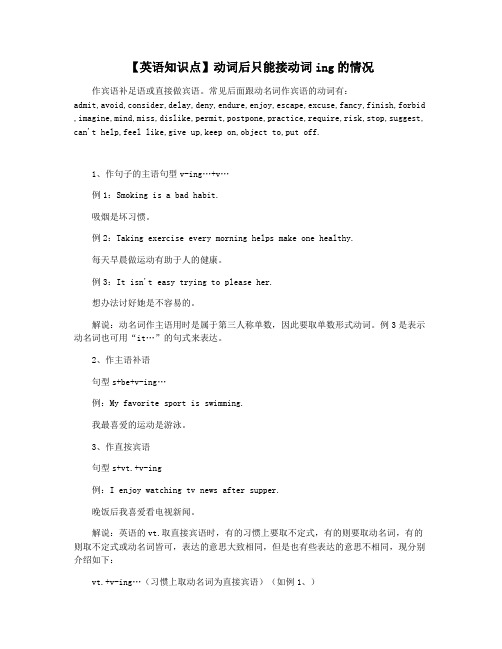
【英语知识点】动词后只能接动词ing的情况作宾语补足语或直接做宾语。
常见后面跟动名词作宾语的动词有:admit,avoid,consider,delay,deny,endure,enjoy,escape,excuse,fancy,finish,forbid ,imagine,mind,miss,dislike,permit,postpone,practice,require,risk,stop,suggest, can't help,feel like,give up,keep on,object to,put off.1、作句子的主语句型v-ing…+v…例1:Smoking is a bad habit.吸烟是坏习惯。
例2:Taking exercise every morning helps make one healthy.每天早晨做运动有助于人的健康。
例3:It isn't easy trying to please her.想办法讨好她是不容易的。
解说:动名词作主语用时是属于第三人称单数,因此要取单数形式动词。
例3是表示动名词也可用“it…”的句式来表达。
2、作主语补语句型s+be+v-ing…例:My favorite sport is swimming.我最喜爱的运动是游泳。
3、作直按宾语句型s+vt.+v-ing例:I enjoy watching tv news after supper.晚饭后我喜爱看电视新闻。
解说:英语的vt.取直接宾语时,有的习惯上要取不定式,有的则要取动名词,有的则取不定式或动名词皆可,表达的意思大致相同,但是也有些表达的意思不相同,现分别介绍如下:vt.+v-ing…(习惯上取动名词为直接宾语)(如例1、)admit(承认),advise(劝告),avoid(避免),consider(考虑),escape(脱逃),finish(做完),keep(on)(持续),practice(练习),quit (停止),resist(抵抗),risk(冒险),stand(忍受——否定句),stop(停止),understand(了解),etc.感谢您的阅读,祝您生活愉快。
只接动名词的动词

只接动名词的动词miss失去, mind介意, enjoy喜欢, give up放弃, finish完成, avoid避免, practise实践, escape逃跑, stop停止, excuse原谅, delay耽误, require 要求, suggest建议, insist on坚持, can’t help禁不住, complete完成, deny否认, put off推迟, favor赞成,支持, understand明白, risk冒险, keep保持, consider考虑,imagine想象、猜想,fear 害怕,include 包括,suffer痛苦、遭受,report报告,celebrate庆祝prevent阻止。
等。
有些动词后面即可接-ing又可接不定式即permit, allow, encourage, advise, recommend, forbid等一般用动词-ing结构做宾语,但如有自己逻辑主语时要用不定式。
e.g. 1.They don’t allow smoking in the auditorium.礼堂内禁止吸烟。
2.The doctor advised taking exercise.医生劝告要参加锻炼。
3.We don’t permit talking in class.我们不允许在课堂上讲话。
4.They forbid parking here.这儿禁止停车。
5.He permitted me to arrive late, with an excuse.说明了理由,他允许我来晚了。
6.The teacher forbids us to talk in class.老师允许我们上课讲话。
Two:1. I crossed the street to avoid meeting him, but he saw me and came running towards me.我横穿马路以便避开他,但他看到了我并朝我跑过来。
后接动名词的动词

动词形式一、后接动名词的动词admit 承认/ advise 建议/ allow 允许/ appreciate 感激/ avoid 避免/ consider 考虑/ delay 推迟/ deny 否认/ discuss 讨论/ dislike 不喜欢/ enjoy 喜爱/ escape 逃脱/ excuse 原谅/ fancy设想/ finish 完成/ forbid 禁止/ forgive 原谅/ imagine 想像/ keep 保持/ mention 提及/ mind 介意/ miss 没赶上/ pardon 原谅/ permit 允许/ practise 练习/ prevent 阻止/ prohibit 禁止/ put off 推迟/ report 报告/ risk 冒险/ stop 停止/ suggest 建议/ carry on继续/ can’t help 禁不住/ feel like 想要/ give up放弃/ keep on 继续/ put off 推迟/ set about 开始,着手/ object to 反对/ insist on 坚持/ pay attention to 注意/ stick to 坚持/ get down to 开始认真做/ look forwards to 期盼/ be [get] used to 习惯于/ lead to 导致/ be devoted to 致力于,专用于二、后接不定式作宾语的动词afford 负担得起/ arrange 安排/ ask 要求/ care 想要/ choose 决定/ decide 决定/ demand 要求/ determine 决心/ expect 期待,预计/ help 帮助/ hesitate 犹豫/ hope 希望/ long 渴望/ manage 渴望设法/ offer 主动提出/ plan 计划/ prepare 准备/ pretend 假装/ promise 答应/ refuse 拒绝/ want 想要/ wish 希望三、既可接动名词也可接不定式作宾语但意义不同的动词(1) remember(记得),forget(忘记),regret(后悔)后接不定式指该不定式所表示的动作还未发生,后接动名词(有时可用完成式),则指该动名词所表示的动作已经发生。
常用来接动名词做宾语的动词

常用来接动名词做宾语的动词哪些动词或短语接动名词是测试中的重点。
往往可分以下两种,现总结如下:①下列动词后常常只能接动名词作宾语:acknowledge承认,自认;advise建议;admit 承认;allow;avoid避免;appreciate感激;bar禁止;cease 停止;consider考虑;confess坦白;delay 延期;deny否认,抵赖;dislike不喜欢,讨厌;enjoy喜欢; escape逃跑;excuse 宽恕;fancy幻想,爱好, imagine想象;include包括、包含;finish完成; complete 完成;forbid禁止;forgive宽恕;imagine想象;mention提到;mind介意、反对; miss错过,想念;keep保持;pardon; 宽恕,原谅practise练习;permit 许可;risk冒险;resist忍住、不屈服于;suggest提议;postpone=put off 延期,推迟;understand理解;favour造成,偏爱; involve卷入,产生某种必然的结果;recall回想;resume恢复;quit放弃、停止;report报告; tolerate 忍受,容忍; hinder耽搁、妨碍;resume继续、重新开始;recommend建议、劝告;等等。
例如:1.In some countries people favor staying together even though there is much more space.在一些国家,尽管有很多空地,人们还是愿意住在一起。
2.With apples at 25 cents a pound, we couldn't resist taking four pounds.由于苹果25分一磅,我们禁不住买了四磅。
3.My mother dislikes seeing you with me. =My mother dislikes our being together.我母亲不喜欢看到你我在一起。
英语中哪些动词后跟动名词

appreciate(感激),understand, insist on, look forward to,get downto,
devote oneself to, prefer…to… object to (反对), put off, apologize to sb.
for,
give up,
forgive sb. for, be worth, be fond of, be good at, be slow in, be active
in,
be afraid of, be tired of, be busy, succeed in,
prevent/stop/keep sb. from, spend time (in), have difficult/trouble in,
跟不定式(to do)作宾语的动词:
want, wish, hope, manage, pretend, decide, learn, agree, expect, demand,
long, ask,
care, choose, dare, fail, offer, plan, prepare, promise, refuse, desire,
It’s no use/good,
be pround of, instead of.
happen,
appear, intend, would like to, be said to,
B.跟动名词(doing)作宾语的动词:
suggest, admit, finish, avoid, mind, enjoy, delay, practice, excuse sb.
英语惯用法10动词后接动名词

1.表示“保证”“使相信”或 “说服”的动词
assure, convince, persuade 等
2.表示“通知”,“告诉”, “提醒”或“警告”的动词
admonish(警告), apprise(通知), inform, notify(通知), remind, warn等 如:please apprise them of our safe arrival. Parents admonished her of the dangerous situation.
5.表示“除掉”或“摆脱”的动词
cleanse(清除), clear (清除), disabuse(去掉), disburden(去 掉), disembarrass(使解脱), ease(去 掉,使安心), exorcise(清除), purify (清除), relieve(去掉), rid(去掉), sweep(扫于) get down to (开始) pass on to (转向) plead guilty to (服罪) set one’s mind to (一心做)
with regard/ relation to (关于) with an eye/ view to (着眼于) as to (关于) in reference to (关于)
4.表示“剥夺”或“夺走”的动词 bereave(夺走), denude(剥 去), deprive(剥夺), dispossess(剥夺), divest(剥夺),shear(剥 夺), strip(剥去)等
如: The floods bereaved him of his families. They divested the king of all his power. Don’t strip the tree of its leaves.
后面接动名词作宾语的所有动词汇总

一、后面接动名词作宾语的所有动词汇总下面的动词要求动名词作宾语:动词+动名词(作宾语)acknowledge承认,自认cease 停止mention说到,讲到admit 承认tolerate忍受dislike不喜欢,讨厌advocate:提倡,主张complete完成dread可怕appreciate 感激,欣赏confess坦白endure忍受avoid避免contemplate细想enjoy享有,喜爱bear忍受defer拖延envy嫉妒can't help不禁delay延迟escape逃跑,逃避can't stand受不了deny否认excuse借口consider 考虑detest嫌恶fancy幻想,爱好favor 造成,偏爱mind 介意repent悔悟figure描绘,计算miss错过resent怨恨finish完成,结束不得pardon原谅,饶恕resist抵抗,阻止forgive原谅permit 允许resume恢复imagine设想postpone延迟,延期risk冒险involve卷入,包含practise 实行,实践suggest建议hate讨厌prevent阻止save营救,储蓄keep保持quit放弃停止stand坚持,忍受loathe非常讨厌,厌恶recall回想例如:I appreciate having been given the opportunity to study abroad two years ago.我很感激两年前给我出国学习的机会.(3)有些动词后使用动名词和动词不定式作宾语的差别(1)forget to do 忘记要去做某事(此事未做)forget doing忘记做过某事(此事已做过或已发生)2)stop to do 停止中断(某件事),目的是去做另一件事stop doing 停止正在或经常做的事3)remember to do 记住去做某事(未做)remember doing记得做过某事(已做)4) regret to do对要做的事遗憾regret doing对做过的事遗憾、后悔5)try to do努力、企图做某事try doing试验、试一试某种办法6) mean to do打算,有意要…mean doing意味着7)go on to do 继而(去做另外一件事情)go on doing 继续(原先没有做完的事情)8)propose to do 打算(要做某事)proposing doing建议(做某事)9) like /love/hate/ prefer +to do 表示具体行为;+doing sth 表示抽象、倾向概念(注)如果这些动词前有should一词,其后宾语只跟不定式,不能跟动名词.例如:I should like to see him tomorrow.10) need, want, deserve +动名词表被动意义;+不定式被动态表示“要(修、清理等)”意思.Don't you remember seeing the man before?你不记得以前见过那个人吗?You must remember to leave tomorrow.你可要记着是明天动身.I don't regret telling her what I thought.我不后悔给她讲过我的想法.(已讲过)I regret to have to do this, but I have no choice.我很遗憾必须这样去做,我实在没办法.(未做但要做)You must try to be more careful.你可要多加小心.Let's try doing the work some other way.让我们试一试用另外一种办法来做这工作.I didn't mean to hurt your feeling.我没想要伤害你的感情.This illness will mean (your) going to hospital.得了这种病(你)就要进医院.(一)动名词与不定式的区别动名词起名词作用,在句子中可以作主语、宾语、表语、定语、主语补足语、宾语补足语.不定式起名词、形容词、副词作用,在句子中除了动名词所起的作用外,还可以作状语.但两者之间也有差别:1. 不定式的逻辑主语必须与主语一致,而动名词的逻辑主语范围较大,它可以指主语,也可以是泛指.如:I hate to work on weekends. 我讨厌周末干活.(指自己干活)I hate working on weekends. 我讨厌周末干活.(可以指自己,也可以泛指)2. 动名词多指抽象的、概念性的动作,可以是多次的、经常的行为;不定式多表示具体的动作,尤其是某一次的动作.如:Reading in bed is a pleasure. 躺着看书是一种乐趣.I like swimming but I don't like to swim in the pool today. 我喜欢游泳,但是今天我不喜欢在游泳池里游泳.试比较:Playing with fire is dangerous. 玩火危险.(泛指玩火)To play with fire will be dangerous. 玩火会发生危险.(指一具体的动作)Talking for hours is more exhausting than you think. 一连讲几小时的话会比你想像的要累.(泛指讲话)To talk for hours is more exhausting than you think. 一连讲几小时的话可比你想像的要累.(指个人感受)3. 在某些动词之后只能用动名词,而另一些动词之后只能用不定式. 常后接动名词的动词有:admit, avoid, consider, defer (推迟,延期),delay,deny, dislike,enjoy,escape, fancy,finish,imagine,include,keep,mind,miss,postpone (推迟,延期),practise,recall,recollect,resent, resist, risk, stop, suggest等〇常后接动名词短语动词有have done, give up等.常后接不定式的动词有:afford, agree, aim, ask, claim,choose,decide, decline, demand, desire, determine, expect, fail, hope, manage, offer, plan,pretend, promise, refuse, resolve, threaten,wish等.4. 有不少动词既可后接动名词也可接不定式.常见的有begin,continue, dread,fear,forget,go on, hate, help, intend, leam, like, love, mean, need, neglect, proceed, propose, regret, remember, start, stop, try, want等.这些动词后接的动名词与不定式在意义上往往没有什么区别.但有时两者的意义却有不同:(1) remember和forget后接不定式时,表示没有发生的动作,而接动名词时,表示已经发生过的动作.如:I remember doing that thing. 我记得做过那件事.I remember to do that thing. 我记着要去做那件事.I forgot to lock my door when I left the room. 当我离开房间时,我忘记锁门了.I forgot locking my door when I left the room. 我忘记了我离开房间时已把门锁上了.(2) stop接动名词,表示“停止正在做的事”;stop后接不定式表示“停下来去做某事”,该不定式不是宾语,而是目的状语.如:You'd better stop smoking. 你最好不要吸烟了.Stop to listen to the teacher. 停下来听老师讲.(3)try接不定式,表示“努力做某事”;try接动名词,表示“尝试做某事”.如:Try to do it again, you'll finish it. 努力再试一次,你就会完成的.They try reading the story in English. 他们试着用英语读那个故事. (4) regret后接不定式时,指将来或现在的动作;regret后接动名词时,指过去或现在的动作;regret后接动名词的完成式时,指过去的动作.如:I regret telling you the bad news. 我后悔把这个坏消息告诉你.I regret to say I'm unable to help you. 很抱歉我不能帮助你.(5)help后接动名词意谓“避免”,help后接不定式意为“帮助”.如:I can't help laughing. 我不禁笑起来.I can't help to clean up the place. 我不能帮忙打扫这地方.(6)mean后接动名词意为“意味着”,mean后接不定式意为“打算”.如:Doing morning exercises means getting up early. 做早操意味着要早起.I meant to help you. 我意在帮你.5. 有些动名词的主动式可表达被动意义,而不定式则须用其被动式表达被动意义.如:我不堪被人想念.I won't bear thinking of.I won't bear to be thought about.它需要修理.It needs repairing.It needs to be repaired.6. 有些动词在书面语中后多接动名词,在口语中后多接不定式.如:开始下雨了.It started raining.It started to rain.我害怕冒犯她.I fear offending her.I fear to offend her.7. 在should (would) like, love等之后须用不定式.如:I'd like to thank you again. 我愿再次感谢你.I'd love to come sometime. 日后我愿意来的.。
动词后接动名词和不定式作宾语的区别

英语教材里后接动名词和不定式作宾语的动词一、有些动词只能接不定式做宾语。
例如:help,hope,ask,refuse,decide,promise,wish,pretend,expect,learn,plan,manage,agree,fail,offer,happen,seem等等。
例如:He refused to speak on the radio.二、有些动词或短语只接动名词做宾语:mind,finish,enjoy,suggest,consider,miss,keep(on),avoid避开,躲开,stand(忍受),allow ,practicegive up,put off,look forward to期待,期望,feel like想要做某事,prevent…from,阻止can't help禁不住,不由自主迫不及待,be/get used to ,be worth doing,be busy doing例如:His wife doesn't allow smoking inside the room and often advised him to give up smoking.I'm looking forward to hearing from you soon.She doesn't feel like eating anything,being ill for a few days.三、有些动词后面既可接不定式,又可接动名词,其意义基本相同,区别不大。
如;like,love,hate,prefer.begin,start.注意:begin和start本身为进行时,或后面动词为心理变化意义的动词时,须接不定式。
例如:When we came in, they were beginning to have supper.After his explanation, I began to understand it / realize that I was wrong.四、有些词后面既可以接不定式.亦可接动名词,但其意义有很大区别,须特别注意:A.remember,forget,接动名词,表示完成意义(=having done),接不定式,表示将来意义:例如:Please remember to bring me the book I want next time. I remember seeing her(=having seen her) somewhere before.B.mean:mean to do=want to do打算,想要……;mean doing:意味着,就是例如:I am sorry, I didn't mean to hurt your feelings,Learning a foreign languagedoesn't mean just working in class.C.stop:stop to do停下来,要干另一件事,不定式作目的状语;stop doing停止干……,动名词作宾语。
英语语法:动词后可跟动名词也可跟不定式

英语语法:动词后可跟动名词也可跟不定动词后可跟动名词也可跟不定式跟动名词表示动作发生在以前,指做过的事情;跟不定式表示动作发生在以后,指要去做的事情。
常用动词如下:continue,remember,advise,agree,dread,recommend,attempt,propose,regret,plan,allow,cease,begin,forget,hate,prefer,intend,like,love,cannot,bear,mean,need,start,permit,prefer,require,neglect,start,undertake,stop,try,omit,want 试比较:remember to do sth. 记住要去做某事remember doing sth.记得曾经做过某事forget todo sth.忘记要去做某事forget doing sth.忘记曾做过某事stop to do sth. 停下某事去做……stop doing sth. 停止做某事go on to do sth.(做完某事)接着做另一件事go on doing sth.继续做某事regret to do sth. 对未来行为表示遗憾regret doing sth. 对已发生的行为表示后悔try to do sth.尽力做某事try doing sth. (做某事)试试propose todo sth. 打算做某事propose doing sth. 建议做某事一、单项选择。
3.___ from a distance things appear rather small.A. SeeingB. SeeingC. SeenD. To see4.___ from the space,the Great Wall looks like a dragon.A. Having seenB. SeeingC. SeenD. To see参考答案:3-4:BC二、分析句子的英语语法结构,并翻译成中文Donald Trump has dismissed concerns about the widely condemned human rights record of the North Korean dictator,Kim Jong-un,praising him as a “tough guy”,a “smart guy”and a “great negotiator”.【The Guardian】。
英语语法顺口溜:哪些动词后面只能接动名词背诵口诀

英语语法顺口溜:哪些动词后面只能接动名词背诵口诀哪些动词后面只能接动名词,下面的顺口溜有助于记忆喜欢、考虑不可免(enjoy, consider, escape, avoid)停止,放弃太冒险(stop, give up , risk)反对想象莫推延(mine, imagine, delay, put off)要求完成是期望(require, finish, look forward to.)建议继续勤*练(suggest, go on, practise)不禁原谅要坚持(can’t help, excuse , insist on)继续注意使成功(keep on, mind, succeed in)------------------------------动名词用法详解补充:A.作句子的主语句型 V-ing…+V…例A:Smoking is a bad habit.(吸烟是坏习惯。
)例B:taking exercise every morning helps make one healthy.(每天早晨做运动有助于人的健康。
)例C:It isn't easy trying to please her.(想办法讨好她是不容易的。
)解说动名词作主语用时是属于第三人称单数,所以要取单数形式动词。
例C是表示动名词也可用“It…”的句式来表达。
B.作主语补语句型 S+be+V-ing…例A:My favorite sport is swimming.(我最喜爱的运动是游泳。
)例B:Her only desire is studying music.(她的的愿望就是学音乐。
)C.作直按宾语句型 S+Vt. +V-ing例A:I enjoy watching TV news after supper.(晚饭后我喜爱看电视新闻。
)例B:You'd better stop smoking.(你把烟戒掉了。
后接动名词的动词搭配

后接动名词的动词搭配aim at 目的在于,旨在;瞄准;企图accuse…Of… 控告;谴责,depend on 取决于,视…而定;依靠,依赖;信赖,相信devote to 将…奉献给;把…专用(于)engage in 从事于,参加feel like 想要go on (时间)过去;灯亮;开始运行;继续,接着;进行,发生cannot/couldn’t help 禁不住;不得不insist on 坚持,强调,坚决要求keep from 阻止,抑制keep up 继续进行、继续下去look forward 曲协盼望,期待persist in 坚持不懈,执着prevent from 预防,防止put off 推迟,推延;阻止,劝阻set about 开始,着手succeed in 成功thank for 感谢think of 想起,记得;想出,提出;考虑,关心三、形容组和固定搭配be able to (do) 能(做),会(做)be about to (do) 即将,正要be absent from 缺勤,缺课be abundant in 丰富的,富裕的be accustomed to 习惯于,适应于be acquainted with 与…相识,熟悉,了解be active in 积极于be afraid of 恐怕,害怕,担忧be alive to 注意到,对…敏感be angry at 因某事生气be angry with 对…发怒be anxious about 担心,为…担忧be anxious for 急切盼望,渴望be anxious to(do) 渴望(做)be ashamed of 为…感到害臊be aware of 意识到be bad at 拙于,不善于be based on 根据,以…为基础be beside oneself 极度兴奋,对自己的感情失去控制be better off 生活优裕起来,境况好起来be bound to(do) 一定会,不得不be careful to(do) 务必注意(做)be certain to(do) 一定(做),必然(做)be capable of 能够be confident in 对…有信心be characterized by 以…为特征be clever at 擅长于be combined with 与…结合be composed of 由…组成be concerned about 关心,挂念be curious to(do) 很想(做)be dependent on/upon 取决于,依赖be determined to (do) 决心(做)be different from 与…不同be eager for 渴望be eager to (do) 急于要(做)be equal to 等于be famous for 以…著名be fond of 喜欢,爱好be free from 无…的,摆脱了…的be friendly to 对…友好be glad to (do) 乐于(做),对…感到高兴be good at (doing) 善于,擅长be good for 适于,在…期间有效be grateful to 感谢,感激be independent of 脱离…而独立,与…无关be indispensable for 对…必不可少的be interested in 对…感兴趣be kinde enough to (do) 承…好意,恳请be late for 迟到be likely to (do) 可能要,像是要be mad about 迷恋be well off 生活富裕be pleased to (do) 乐于be pleased with 对…感到满足be popular with 得人心的,受…欢迎的be present at 出席be proud of 以…自豪,因…感到满意be ready to (do) 装备好(做),乐意做be ready for 为…准备好be rich in 富于be satisfied with 对…满意,满足于be second to 次于be short for 是…的缩写(简称)be short of 短缺be sick for 渴望be sick in bed 病在床上be sick of 对…感到厌倦be sorry for 对…感到抱歉be strict with 对…要求严格be suited to 适合于be supposed to (do) 应该,非…不可be sure of 坚信,确信be surprised at 对…感到惊奇be though with 结束be tired from 因…而厌倦be tired of 厌烦,对…厌倦be tired out 疲倦极了be true to 适用于be unconscious of 不知道…be unequal to 无法胜任…的be unfit for 不适合,不胜任be useful to 对…有用be well up in 精通,熟悉be wild with jay 欣喜be willing to (do) 乐意…be worried about 为…而担心be worse off 处境较坏,情况恶化be worth (doing) 值得(做)be wrong with 有点毛病,有些不舒服-mind(介意) R-risk(冒险) S-stop(停止,可接不定式)P-practise(练习)B-be busy in (忙于) L-look forward to (盼望)A-avoid(避免) C-consider(考虑) K-keep(on)(坚持)M-miss(想念,错过) I-insist on (坚持) S-suggest(建议)S-succeed in (成功) E-enjoy(爱好) D-delay(延续)A-advise(提议)B-be used to (习惯) E-escape(逃避) F-finish(完成)B-begin(开始,可接不定式)A-admit(承认)G-give up(放弃)1 stop somebody from doing sth. 阻止某人做某事。
动名词做宾语

非谓语动词做宾语用动名词做宾语的动词:Finish, enjoy, suggest, advise, practice, admit, allow, permit, appreciate, avoid, consider, imagine, keep, mind, miss, (can’t) stand, delay,deny, forbid, risk, escape,pardon, excuse接动名词做宾语的词组be used to, lead to, be devoted to, go back to, stick to, insist on, object to, get down to, pay attention to, give up, feel like, apologize for, be busy (in) , have difficulty\ trouble (in) , have a good time (in) , spend time (in) , give up, put off, keep on, look forward to, think of , be \get tired of, be worth, be fond of,succeed in doing sthEg, I enjoyed reading these books very much.He got well-prepared for the job interview, for he couldn’t risk losing the good opportunity.No one can avoid making mistakes.接动词不定式做宾语的动词Decide, determine, learn, want, expect\hope\ wish\ , refuse, manage, care, pretend, offer, promise, choose, plan, agree, ask, beg, help, afford, strive, happen, wait, struggle, failEg. He failed to pass the driving test.He offered to take the child home.He can’t afford to buy a car.***接不定式做宾语和接动名词做宾语意义不同的动词Forget, remember, regret, stop , try , mean, go on, can’t help题组训练:1.She didn’t remember ________(meet) him before.2.I forgot ______(buy) the book, so I bought one more copy.3.Please remember ______(turn) off the light when you leave.4.Try ______(knock) at the back door and see whether he is in or not.5.We must try _______ (come) here as early as possible.6.Although it started to rain, the farmers went on ______(work) in the field.7.He welcomed the new students and then went on ______(explain ) the school rules.8.I won’t stay if it means _______ (listen) to another dull talk.9.What do you mean ______(do) with it ?10.I regret _______(be) unable to help.11.I don’t regret _______ (tell ) her what I thought , even if it upset her.12.I regret _______(tell) you that you failed in the exam.13.We’re always deeply regretted __________(sell) the house.14.This dictionary can’t help _______(learn) the language.15.He couldn’t help _________(laugh) when he heard the funny story.16.---- When do you plan to leave ?---- I mean ________ (leave ) tomorrow.*** allow\permit\ forbid\advise doing \ sb to do sth.Eg. Smoking is forbidden here but you are allowed to smoke.We don’t allow smoking in the hall.**** need\ require\ want doing \ to be doneEg, The window needs \ requires \ wants to be cleaned. \ cleaning.***begin , start 后面跟动名词和动词不定式都可以,但注意三种情况Eg. I was beginning to get angry.He began to realize the importance of foreign languages.When we got to the foot of the mountain, it started to snow.*** It is no use\good arguing with him about it.It is a waste of time arguing with him about it.*** There is no telling where he has gone.There is no knowing whether he’ll come here or not.不定式作主语和动名词作主语的区别eg. Reading( To read) good books enriches our mind.eg. To get up early tomorrow morning is very important.Getting up early and going to bed early is a good habit.To finish reading such a long novel will take me several days.Swimming is good for health, but to swim in such a polluted river is harmful to health. 表语:eg. His habit is having(to have) a walk after supper.Your work today is to carry these things upstairs.To see is to believe.Seeing is believing.。
动词后跟不定式或动名词作宾语的动词记忆

动词后跟不定式或动名词作宾语的动词记忆动词+to do(谐音:动图图)和动词+ doing(谐音:动都因)动词-----谐音和故事记忆◆“动图图谐:动+to do”动词——动词后跟动词时只能以to v式作宾语:图图(to do)爱思考(ask)爱考虑(agree),计划(plan)想要(want)飞啊飞(fail/offer),希望(wish)希望(hope)又盼望(expect),决定(decide)做成(manage)它,告诉(tell)傻妈(seem)怕拒绝(refuse),假装(pretend)答应(promise)在学习(learn),“好吧(help)好吧(happen)”!◆“动都因谐:动+ doing”动词——动词后跟动词时只能以v-ing式作宾语:(一)都因(doing)阿拉(allow)还弗懂(avoid),看书(consider)一瞧(enjoy)finish,妈咪(mind/miss)看陪(keep)不让看电视(practice):二阻止(stop/prevent)三推迟(postpone/delay/put off),期望(look forward to)我放弃(give up),我忍受(stand)!但禁不住(can’t help doing)想要(feel like)看电视,我知道忙于(be busy doing)学习是值得(be worth doing)的,渐渐习惯于(be used to doing):8个印度人(in doing)的声音(省in)1−1(do哆)−1.(in) doing(二)李梅(remain仍然,一直)提起闷心(mention)事,哭吧(keep)哭吧(keep on)继续啼——老可怜的(recollect/recall)回忆!承认(admit)欣赏(appreciate)冒险(risk)哥,一生可陪不逃避(escape)。
涉及幸福(involve),李梅想象又想象(imagine/空想fancy)、期望又期望(anticipate/look forward to)。
动词后面只能接动名词的初中常考14个
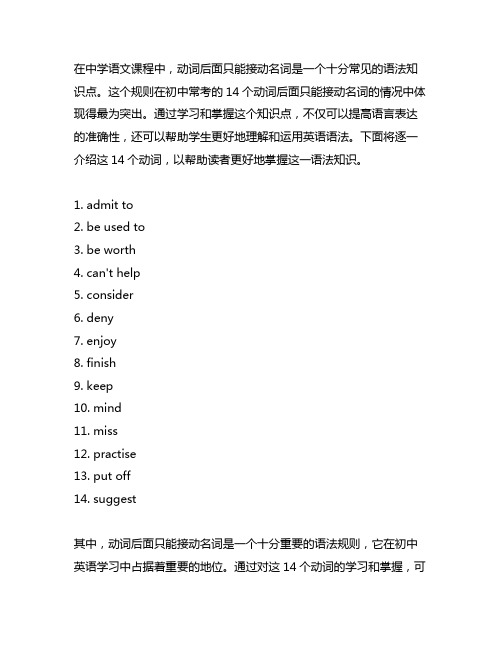
在中学语文课程中,动词后面只能接动名词是一个十分常见的语法知识点。
这个规则在初中常考的14个动词后面只能接动名词的情况中体现得最为突出。
通过学习和掌握这个知识点,不仅可以提高语言表达的准确性,还可以帮助学生更好地理解和运用英语语法。
下面将逐一介绍这14个动词,以帮助读者更好地掌握这一语法知识。
1. admit to2. be used to3. be worth4. can't help5. consider6. deny7. enjoy8. finish9. keep10. mind11. miss12. practise13. put off14. suggest其中,动词后面只能接动名词是一个十分重要的语法规则,它在初中英语学习中占据着重要的地位。
通过对这14个动词的学习和掌握,可以帮助学生更好地运用这一语法知识,提高语言表达的准确性和流利度。
对于中文母语的学生来说,这些动词后面只能接动名词的情况也常常与中文的表达方式不同,需要花费一些时间去适应和掌握。
在学习动词后面只能接动名词的情况时,我们需要注重在实际语境中的运用。
通过大量的练习和反复的操练,可以帮助学生更好地掌握这一语法知识。
老师在教学中也可以通过丰富多样的教学活动和游戏,来帮助学生更好地理解和运用这一知识点。
动词后面只能接动名词的初中常考14个动词,是一个学习英语语法时需要重点掌握的知识点。
通过对这些动词的学习和练习,可以帮助学生提高语言表达的准确性和流利度,更好地理解和运用这一语法规则。
对于中文母语的学生来说,需要花费一定的时间去适应和掌握这一规则,但通过持之以恒的努力,一定能够取得显著的进步。
希望通过本文的介绍和分析,读者能够更深入地理解和掌握这一知识点,从而在英语学习中取得更大的进步。
也希望能够激发读者对英语学习的兴趣,让英语学习成为一件有趣并且有意义的事情。
在学习动词后面只能接动名词的情况时,我们需要注重实际语境中的运用。
后接动名词(doing)的动词
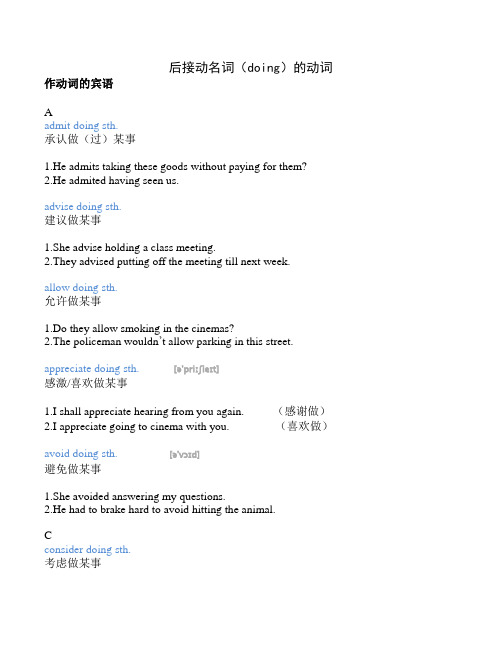
后接动名词(doing)的动词作动词的宾语Aadmit doing sth.承认做(过)某事1.He admits taking these goods without paying for them?2.He admited having seen us.advise doing sth.建议做某事1.She advise holding a class meeting.2.They advised putting off the meeting till next week.allow doing sth.允许做某事1.Do they allow smoking in the cinemas?2.The policeman wouldn’t allow parking in this street. appreciate doing sth. [ə'priːʃieɪt]感激/喜欢做某事1.I shall appreciate hearing from you again. (感谢做)2.I appreciate going to cinema with you. (喜欢做)avoid doing sth. [ə'vɔɪd]避免做某事1.She avoided answering my questions.2.He had to brake hard to avoid hitting the animal.Cconsider doing sth.考虑做某事1.We are considering building a library here.2.He was considering taking the table downstairs.3.I have often considered studying abroad.Ddelay doing sth. [dɪ'leɪ]推迟做某事1.They have delayed opening the new school.2.He delayed fixing the roof although it leaked badly. deny doing sth. [dɪ'naɪ]否认做某事1.He denied knowing anything about their plans.2.Jack denied doing anything illegal.discuss doing sth.讨论/商量做某事1.They discussed selling the house.2.We are discussing buying a new car.Eenjoy doing sth.喜爱做某事1.I enjoy watching films.2.Little boys enjoy reading picture books.escape doing sth. [ɪ'skeɪp]逃脱/避免做某事1.There is no way to escape doing the hard work.2.He was lucky to escape being killed.Ffancy doing sth. ['fænsi]设想/想要做某事1.I don’t fancy going back to that dreary house alone.2.What do you fancy doing?补充:以fancy doing sth 句式呈现的感叹句通常表示惊奇、出乎意料或难以想像。
动名词词作宾语

I
like reading books of this kind. 我喜欢看这种书。 Do you like playing chess? 你喜欢下棋吗?
我们学过的这些短语后接动名词做宾语。例如:be
Interesed in,be crazy about,look forward to,be Used to , keep on, be busy (in) doing etc. e.g Lihua interested in playing computer games.
洛南Байду номын сангаас职教中心 16级现代农艺(2)班,讲授:刘宇
后跟动名词作宾语的常见动词有:begin、miss
Keep 、miss、finish、like、enjoy、mind、 suggest、hate、dislike、love、need、 stop/forget/remember、practice etc. e.g.Have you finished painting the windows? 窗子漆好了没有? Would you mind shutting the door? 劳驾把门关上好吗? I enjoyed working here. 我在这里工作很高兴
be worth dong,can’t help doing ,give up dong 。 I cannot help laughing. 我禁不住笑了起来 The book is worth reading. 这本书值得一读。
后面只能用动名词做宾语的动词记忆口诀
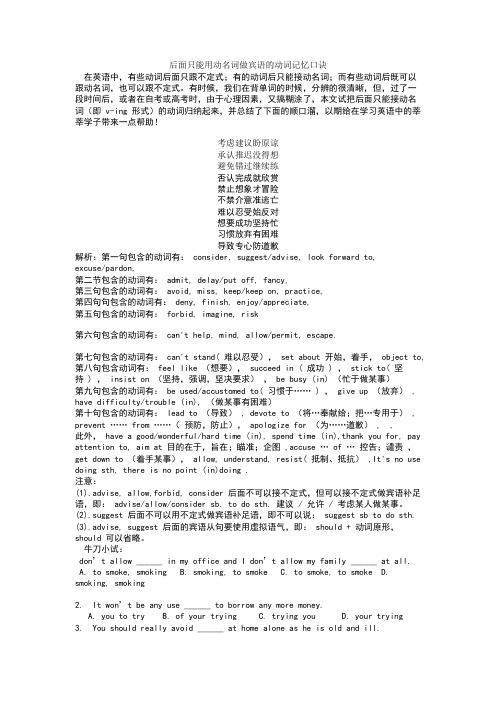
后面只能用动名词做宾语的动词记忆口诀在英语中,有些动词后面只跟不定式;有的动词后只能接动名词;而有些动词后既可以跟动名词,也可以跟不定式。
有时候,我们在背单词的时候,分辨的很清晰,但,过了一段时间后,或者在自考或高考时,由于心理因素,又搞糊涂了,本文试把后面只能接动名词(即 v-ing 形式)的动词归纳起来,并总结了下面的顺口溜,以期给在学习英语中的莘莘学子带来一点帮助!考虑建议盼原谅承认推迟没得想避免错过继续练否认完成就欣赏禁止想象才冒险不禁介意准逃亡难以忍受始反对想要成功坚持忙习惯放弃有困难导致专心防道歉解析:第一句包含的动词有: consider, suggest/advise, look forward to,excuse/pardon,第二节包含的动词有: admit, delay/put off, fancy,第三句包含的动词有: avoid, miss, keep/keep on, practice,第四句句包含的动词有: deny, finish, enjoy/appreciate,第五句包含的动词有: forbid, imagine, risk第六句包含的动词有: can't help, mind, allow/permit, escape.第七句包含的动词有: can't stand( 难以忍受), set about 开始,着手, object to,第八句包含动词有: feel like (想要), succeed in ( 成功 ) , stick to( 坚持 ) , insist on (坚持,强调,坚决要求), be busy (in) (忙于做某事)第九句包含的动词有: be used/accustomed to( 习惯于…… ) , give up (放弃) ,have difficulty/trouble (in), (做某事有困难)第十句包含的动词有: lead to (导致) , devote to (将…奉献给;把…专用于) , prevent …… from ……(预防,防止), apologize for (为……道歉) , ,此外, have a good/wonderful/hard time (in), spend time (in),thank you for, payattention to, aim at 目的在于,旨在;瞄准;企图 ,accuse … of …控告;谴责,get down to (着手某事), allow, understand, resist( 抵制、抵抗) ,It's no usedoing sth, there is no point (in)doing .注意:(1).advise, allow,forbid, consider 后面不可以接不定式,但可以接不定式做宾语补足语,即: advise/allow/consider sb. to do sth. 建议 / 允许 / 考虑某人做某事。
- 1、下载文档前请自行甄别文档内容的完整性,平台不提供额外的编辑、内容补充、找答案等附加服务。
- 2、"仅部分预览"的文档,不可在线预览部分如存在完整性等问题,可反馈申请退款(可完整预览的文档不适用该条件!)。
- 3、如文档侵犯您的权益,请联系客服反馈,我们会尽快为您处理(人工客服工作时间:9:00-18:30)。
14. consider 考虑 Would you consider working in Australia?
15. escape 逃脱 There is no way to escape doing the work. 16. risk 冒险 He risked losing his life to save the child. 17. mind 介意 Would you mind closing the door? 18. resist 抵制 I was unable to resist laughing.
25. advise I advise waiting till the right time. 26. Keep If you keep practising your spoken English, you'll soon make great progress.
6. put off 推迟 He put off making decision till he had more information. 7. suggest 建议 He suggested going fishing this afternoon. 8. recommend 建议 I recommend buying this dictionary. 9. finish 完成 He finished reading the book before supper. 10. practise 练习 Before she went abroad, she spent as much time as she could practising speaking English.
11. enjoy 喜欢 I enjoy listening to light music.
12. imagine 想象 Can you imagine living with such a boring man? 13. deny 否认 He denied knowing anything about their plans.
19. can’t help 止不住 I couldn’t help l to I am look forward to hearing from you. 21. succeed in He did not succeed in committing suicide. 22. be worth The book is well worth reading. 23. give up 放弃 He gave up smoking . 24. can’t stand 不能容忍 I can't stand doing my homework.
1.admit 承认 He admitted breaking the window. 2.appreciate 感激 We shall appreciate hearing from you again. 3.avoid 避免 They all avoided mentioning that name. 4.delay 耽误,推迟 Why have they delayed answering our letter? 5. miss 错过 I narrowly missed being hit by a car yesterday.
